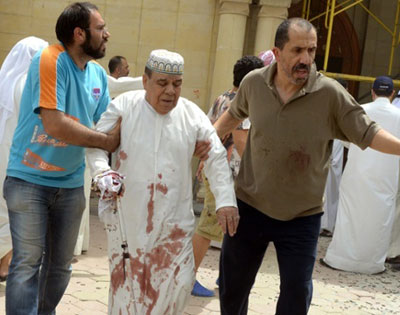By FnF Desk | PUBLISHED: 27, Jun 2015, 11:42 am IST | UPDATED: 27, Jun 2015, 12:46 pm IST

Kuwait City: A volley of terror attacks has struck across three continents, leaving dozens dead in Tunisia, Kuwait and France, just days after the militant group Islamic State issued a call to arms for the holy month of Ramadan.
Near-simultaneous attacks targeted tourists at a hotel resort in Tunisia and Shia worshippers in a mosque in Kuwait, and, reportedly, a delivery company boss at a factory in France.
The trio of attacks marks a new low point in the global terror onslaught. In Tunisia, at least 37 people were shot dead in the country’s deadliest terrorist attack. In Kuwait, 25 were killed and more than 200 injured in a suicide bomb – the first attack in the country since 2005. In France, the victim was decapitated, the first time that grim method had been used in the country.
Islamic State claimed responsibility for the Kuwait incident, but the affiliation and inspiration of the other attackers remained unclear. Isis’s chief spokesman, Abu Mohammad al-Adnani, called on jihadists earlier this week to “make the month of Ramadan a calamity on the apostates” by stepping up attacks and seeking “martyrdom”.
All three attacks were launched early on Friday morning.
In Tunisia, the health minister said 37 people were killed and 36 wounded – mostly tourists – in an attack on the Imperial Marhaba hotel at the beach resort town of Sousse, about 93 miles south of Tunis.
The gunman approached the resort from the beach, opening fire on sunbathing tourists, before entering the hotel through the pool area. Many of the victims were thought to be British, German and Belgian. The gunman was killed. Suspected accomplices were arrested.
In the Gulf state of Kuwait, Isis claimed responsibility for a suicide attack at the Imam al-Sadiq Shia mosque in the capital’s centre, which killed 25 people and wounded 202, according to the emirate’s interior ministry.
A militant in a suicide vest blew himself up during Friday prayers. A statement circulated on social media said the attack had targeted a “den of polytheism”. Isis considers Shia Muslims apostates.
In France, the government launched a terrorism investigation into an attack in which a man, thought to be the employer of the suspect, was decapitated and dumped at a factory belonging to an American gas company in the country’s south-east. A suspect, believed to be called Yassin Salhi, was taken into custody. The French interior minister said the suspect had at one time been under investigation for radicalisation, but had no police record.
There was no evidence that the near-simultaneous attacks were coordinated, but they highlighted the growing threat of attacks by jihadists, some of them inspired by Isis rhetoric, across Europe, Africa and the Middle East.
East Africa meanwhile remains prone to its own brand of Islamic extremism and, in Friday’s fourth deadly outbreak of violence, the al-Qaida-linked al-Shabaab group attacked an African Union base in Somalia. There were some deaths, although precise numbers were unconfirmed.
For Isis, the Kuwait attack – and even the suspicion of its involvement in the Tunisian and French episodes – is another propaganda coup despite its battlefield losses in Syria.
The militants recently lost territory near their Raqqa stronghold in Syria to Kurdish and opposition fighters who have come within 30 miles of the city. They also launched suicidal attacks on the Kurdish enclave of Kobane, which was saved at great cost last year from an Isis onslaught.
“This weekend, the story becomes Isis terror worldwide instead of Isis on the back foot,” said Michael Weiss, the co-author of Isis: Inside the Army of Terror. “Information warfare is their greatest asset.
In the Gulf state of Kuwait, Isis claimed responsibility for a suicide attack at the Imam al-Sadiq Shia mosque in the capital’s centre, which killed 25 people and wounded 202, according to the emirate’s interior ministry.
A militant in a suicide vest blew himself up during Friday prayers. A statement circulated on social media said the attack had targeted a “den of polytheism”. Isis considers Shia Muslims apostates.
In France, the government launched a terrorism investigation into an attack in which a man, thought to be the employer of the suspect, was decapitated and dumped at a factory belonging to an American gas company in the country’s south-east. A suspect, believed to be called Yessim Salim, was taken into custody. The French interior minister said the suspect had at one time been under investigation for radicalisation, but had no police record.
There was no evidence that the near-simultaneous attacks were coordinated, but they highlighted the growing threat of attacks by jihadists, some of them inspired by Isis rhetoric, across Europe, Africa and the Middle East.
East Africa meanwhile remains prone to its own brand of Islamic extremism and, in Friday’s fourth deadly outbreak of violence, the al-Qaida-linked al-Shabaab group attacked an African Union base in Somalia. There were some deaths, although precise numbers were unconfirmed.
For Isis, the Kuwait attack – and even the suspicion of its involvement in the Tunisian and French episodes – is another propaganda coup despite its battlefield losses in Syria.
The militants recently lost territory near their Raqqa stronghold in Syria to Kurdish and opposition fighters who have come within 30 miles of the city. They also launched suicidal attacks on the Kurdish enclave of Kobane, which was saved at great cost last year from an Isis onslaught.
“This weekend, the story becomes Isis terror worldwide instead of Isis on the back foot,” said Michael Weiss, the co-author of Isis: Inside the Army of Terror. “Information warfare is their greatest asset.

by : Priti Prakash
The farmers have marched back to Delhi with their demands, for which they sat on roads leading to th...